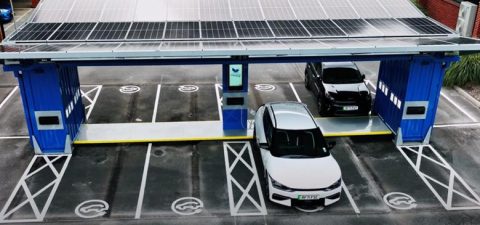
Future mobility: what are the consequences for car washes?
The mobility industry is undergoing rapid change, driven by trends such as EV driving, shared mobility and autonomous cars. These developments pose new challenges for the car wash industry and at the same time open up opportunities for innovative business models. The latest Mobility study by the German TÜV institute provides valuable data on the development of the mobility industry.
Electric driving is clearly picking up speed. Electric cars (EV’s) are increasingly becoming a common sight on the roads. As the TÜV study shows, this could mean far-reaching changes for the car wash industry.
Basically, EV’s are washed like any other vehicle, but e-mobility usually comes with accompanying innovations such as driver assistance systems, a large number of sensors on the vehicle and similar differences to combustion vehicles.
Car wash operators are already noticing changes and disruptions in the car wash process. In addition, the diffuse hesitation when washing electric cars due to a lack of knowledge is noticeable. High-voltage components therefore do not require any special safety precautions, rather the car wash is changing around the e-cars.
Shared mobility
The concept of sharing instead of owning continues to gain ground. Shared mobility reduces the number of vehicles on the road and therefore the need for regular individual car washes. This could lead to a decline in customer numbers at traditional car washes.
At the same time, however, a new demand is emerging: fleets of car-sharing providers require regular care in order to be able to offer their customers clean and attractive vehicles. Who will wash the comunal car fleet?
Autonomous driving
Autonomous vehicles could one day even drive themselves to the nearest car wash, which would fundamentally change business models. For operators, this means that they will potentially have to offer their services around the clock, as the focus will no longer be on the human schedule but on the efficiency of vehicle use.
Conclusions
In light of these developments, car washes need to ask themselves how they want to position themselves. Flexibility and adaptability are required:
- Investment in modern technologies: Car washes should invest in the necessary technology to be able to clean electric vehicles safely and effectively.
- Partnerships with shared mobility providers: Strategic partnerships could ensure stable capacity utilization.
- Expanding the range of services: Round-the-clock services, pick-up and delivery services or premium cleaning services for autonomous vehicles are conceivable.
- Sustainability as a USP: In the course of the green transformation, an ecologically sustainable car wash could be an attractive unique selling point.
The car wash industry is facing new challenges, but at the same time there are also new opportunities.
By understanding and adapting to promising mobility trends at an early stage, operators can consolidate and further expand their market position. New projects can prepare for tomorrow’s mobility today.
Also read:



